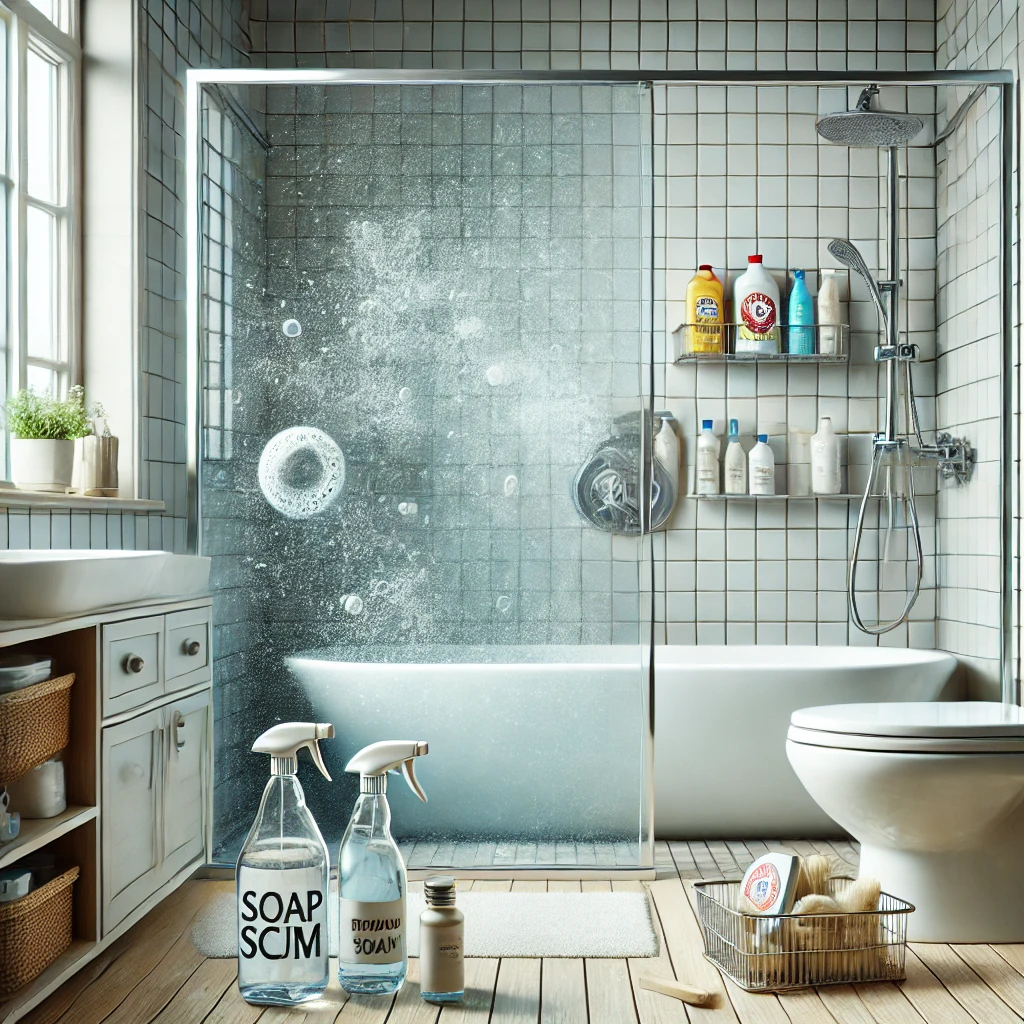
Soap scum and hard water stains are among the most stubborn cleaning challenges in homes. Soap scum is the filmy, chalky residue left behind when soap mixes with minerals in water, such as calcium and magnesium. Hard water stains, on the other hand, appear as cloudy, white spots or streaks caused by the buildup of these same minerals. These unsightly marks are most commonly seen on glass, tiles, faucets, and other surfaces that frequently come into contact with water.
Removing soap scum and hard water stains is not just about keeping your space looking clean. These residues can harbor bacteria and mold, posing hygiene concerns, especially in wet environments like bathrooms. Additionally, neglecting these buildups can lead to long-term damage, such as etching on glass and corrosion on metal fixtures. A clean surface not only promotes a healthier home but also extends the lifespan of your fixtures and maintains their aesthetic appeal.
Understanding Soap Scum and Hard Water Stains
To effectively tackle these issues, it’s essential to understand how they form:
- What Causes Soap Scum?
Soap scum forms when the fatty acids in soap react with the calcium and magnesium in hard water. This reaction creates an insoluble residue that clings to surfaces, especially in moist areas. Bar soaps are particularly notorious for contributing to soap scum because they contain higher levels of these fatty acids compared to liquid soaps. - How Hard Water Contributes to Buildup
Hard water is water that contains high concentrations of dissolved minerals like calcium and magnesium. When water evaporates, these minerals are left behind, creating hard water stains. Over time, these minerals combine with soap residue, exacerbating the buildup and making it even harder to remove. - Common Areas Where They Appear
Soap scum and hard water stains are most commonly found in:- Bathrooms: Shower doors, bathtubs, tiles, and faucets are prime locations.
- Kitchens: Hard water stains often appear on glassware, sinks, and around taps.
- Glass Surfaces: Windows, mirrors, and shower enclosures frequently bear cloudy streaks.
- Tiles and Grout: The porous nature of grout makes it a magnet for soap scum and mineral deposits, leading to discoloration and potential mold growth.
Tools and Supplies You’ll Need
Before diving into the cleaning process, gathering the right tools and supplies is essential for removing soap scum and hard water stains effectively and safely. Having the correct equipment not only simplifies the job but also ensures your surfaces remain undamaged during cleaning.
Basic Cleaning Supplies
These everyday tools are your first line of defense against soap scum and hard water buildup:
- Microfiber Cloths: These are ideal for wiping down surfaces without scratching. They’re excellent for absorbing moisture and trapping small particles, ensuring a streak-free finish.
- Sponges: Choose sponges with a soft side for general cleaning and a slightly abrasive side for tougher stains. Avoid overly rough materials that may damage surfaces like glass or polished metal.
- Scrapers or Plastic Razors: Useful for removing thick layers of buildup on glass or tiles. Always opt for plastic over metal to avoid scratches.
- Toothbrush or Small Detailing Brushes: Perfect for scrubbing grout lines and hard-to-reach areas where soap scum tends to accumulate.
Cleaning Agents: Store-Bought Products vs. Natural Solutions
The right cleaning agent depends on the severity of the buildup and your personal preferences. Both store-bought and natural solutions have their advantages:
- Store-Bought Products:
- Specialized Cleaners: Products like CLR (Calcium, Lime, Rust) or commercial soap scum removers are designed to break down stubborn residue efficiently.
- Glass Cleaners: For light mineral deposits on glass surfaces, ammonia-based cleaners can provide a sparkling finish.
- Descaling Solutions: These are excellent for dissolving mineral deposits from hard water stains, especially on fixtures and tiles.
- Natural Solutions:
- White Vinegar: Its acidic properties make it a powerful cleaner for dissolving mineral buildup. Mix equal parts vinegar and water in a spray bottle for easy application.
- Baking Soda: When mixed with water or vinegar, it forms a gentle abrasive paste that’s perfect for scrubbing without damaging surfaces.
- Lemon Juice: The citric acid in lemons works wonders on hard water stains while leaving a fresh scent behind.
- Dish Soap: Liquid dish soap mixed with warm water can help cut through soap scum, especially when paired with a scrubbing tool.
Protective Gear
Cleaning soap scum and hard water stains often involves chemicals or abrasive scrubbing. Protect yourself by using the right gear:
- Gloves: Rubber or nitrile gloves protect your hands from harsh cleaning agents and prolonged exposure to water.
- Masks: If using strong store-bought cleaners, wearing a mask can help reduce exposure to fumes.
- Safety Goggles: Prevent accidental splashes from irritating your eyes, especially when working with acidic or chemical-based solutions.
Natural Remedies for Soap Scum and Hard Water Stains
When it comes to tackling soap scum and hard water stains, natural remedies are not only effective but also eco-friendly and cost-efficient. Here are some tried-and-true methods:
- Using Vinegar and Baking Soda
White vinegar is a natural acid that dissolves mineral deposits, while baking soda acts as a gentle abrasive.- For Soap Scum: Spray vinegar directly on the affected area, let it sit for 10–15 minutes, then scrub with a sponge dipped in baking soda.
- For Hard Water Stains: Soak a cloth in vinegar and lay it over the stain for 30 minutes before scrubbing.
- This combination works well on tiles, glass, and metal fixtures.
- Lemon Juice and Its Acidic Properties
Lemon juice, with its natural citric acid, effectively breaks down soap scum and mineral buildup.- Squeeze fresh lemon juice onto the stain and let it sit for 10 minutes.
- Scrub with a sponge or soft cloth, then rinse with warm water.
- Lemon juice also leaves a pleasant, fresh scent behind.
- DIY Cleaning Sprays and Pastes
- Mix equal parts vinegar and water in a spray bottle for an all-purpose cleaner.
- For tougher stains, combine baking soda with a few drops of water to form a paste, apply it to the area, and scrub gently.
Commercial Products for Stubborn Buildup
If natural remedies aren’t enough, commercial products designed for soap scum and hard water stains can save the day:
- Recommended Cleaners for Soap Scum
- Products like Scrubbing Bubbles or Zep Shower, Tub & Tile Cleaner are designed to dissolve soap residue quickly.
- Look for options that are non-abrasive to protect your surfaces.
- Best Products for Hard Water Stains
- CLR (Calcium, Lime, Rust) and Lime-A-Way are effective descalers for hard water stains.
- Bar Keepers Friend works wonders on stubborn mineral deposits on sinks and faucets.
- Pros and Cons of Chemical Cleaners
- Pros: Highly effective, fast-acting, and often require less scrubbing.
- Cons: May contain harsh chemicals, produce strong fumes, and can damage delicate surfaces if not used properly.
Step-by-Step Cleaning Guide
Follow these steps to ensure effective and thorough cleaning:
- Preparing the Surface
- Remove any loose dirt or debris from the area.
- Dry the surface slightly, as dampness can dilute cleaning solutions.
- Applying the Chosen Cleaning Solution
- For natural remedies, spray vinegar or apply a baking soda paste to the area.
- For commercial products, follow the instructions on the label, ensuring adequate ventilation.
- Scrubbing Techniques for Different Surfaces
- Tiles and Grout: Use a toothbrush or grout brush for targeted cleaning.
- Glass Surfaces: Use a soft sponge or microfiber cloth to avoid scratches.
- Faucets and Fixtures: Wrap a vinegar-soaked cloth around the fixture for stubborn stains.
- Rinsing and Drying
- Rinse the cleaned area thoroughly with warm water to remove any residue.
- Dry the surface with a microfiber cloth to prevent water spots and future buildup.
Preventing Soap Scum and Hard Water Stains
Prevention is key to keeping your surfaces clean and buildup-free:
- Regular Cleaning Habits
- Wipe down surfaces after each use, especially in bathrooms and kitchens.
- Squeegee glass shower doors after every shower to prevent water spots.
- Installing Water Softeners
- A water softener reduces the minerals in hard water, preventing stains and soap scum from forming in the first place.
- Using Liquid Soap Instead of Bar Soap
- Liquid soaps create less residue compared to bar soaps, minimizing scum buildup.
- Applying Water-Repellent Coatings
- Use products like Rain-X on glass surfaces to repel water and reduce mineral deposits.
Dealing with Tough or Older Stains
Some stains may be too stubborn for standard cleaning methods:
- Specialized Techniques for Stubborn Buildup
- For etched glass, use a glass polishing compound to restore clarity.
- Use a steam cleaner to loosen and dissolve buildup on tiles and grout.
- When to Call in Professional Cleaners
- If stains persist despite your efforts, professionals have access to industrial-grade cleaners and equipment to tackle the toughest cases.
Read more: How to remove soap scum and mold from shower
Conclusion
Soap scum and hard water stains may be stubborn, but they are far from unbeatable. By understanding what causes these common household nuisances and equipping yourself with the right tools and techniques, you can tackle them effectively while preserving the beauty and hygiene of your home.
Natural remedies like vinegar, baking soda, and lemon juice offer eco-friendly and affordable solutions, while commercial products provide fast-acting power for tougher stains. Following a step-by-step cleaning routine ensures thorough removal, and preventive measures like regular cleaning, water softeners, and water-repellent coatings help keep these issues at bay.
By incorporating these practices into your cleaning routine, you can maintain sparkling surfaces, enhance the aesthetics of your living spaces, and protect your home from long-term damage. Whether you prefer DIY solutions or commercial products, the key is consistency and care. With the knowledge shared in this guide, you’re well-equipped to conquer soap scum and hard water stains, keeping your home fresh, clean, and inviting.
